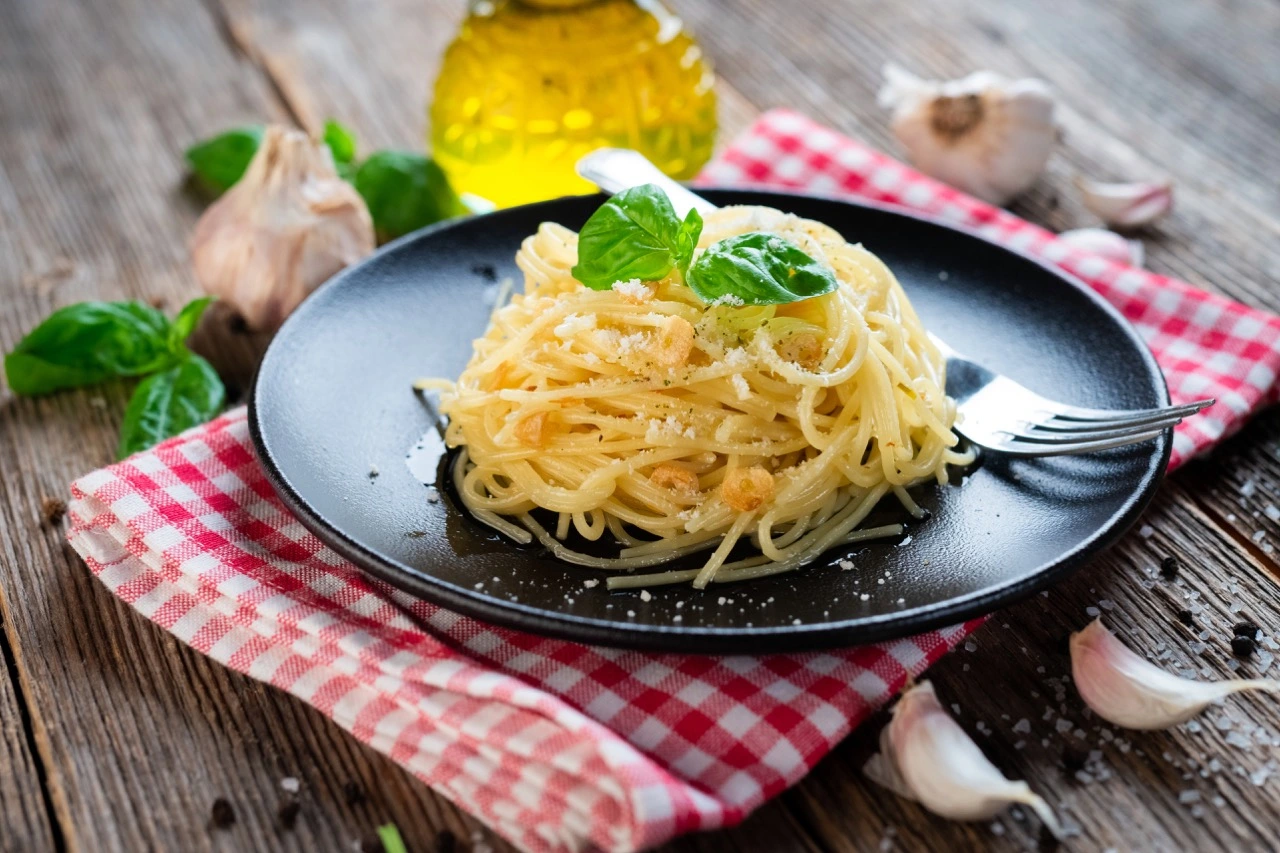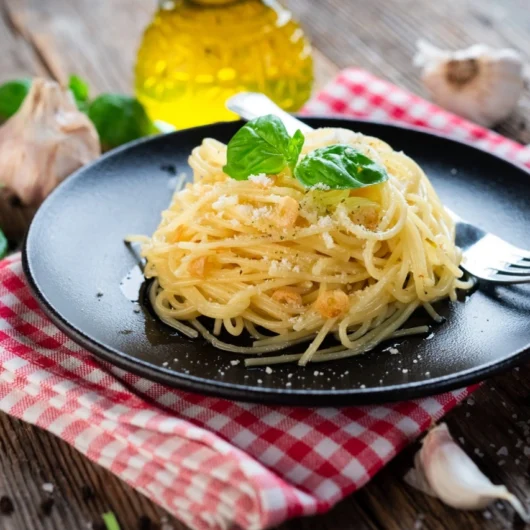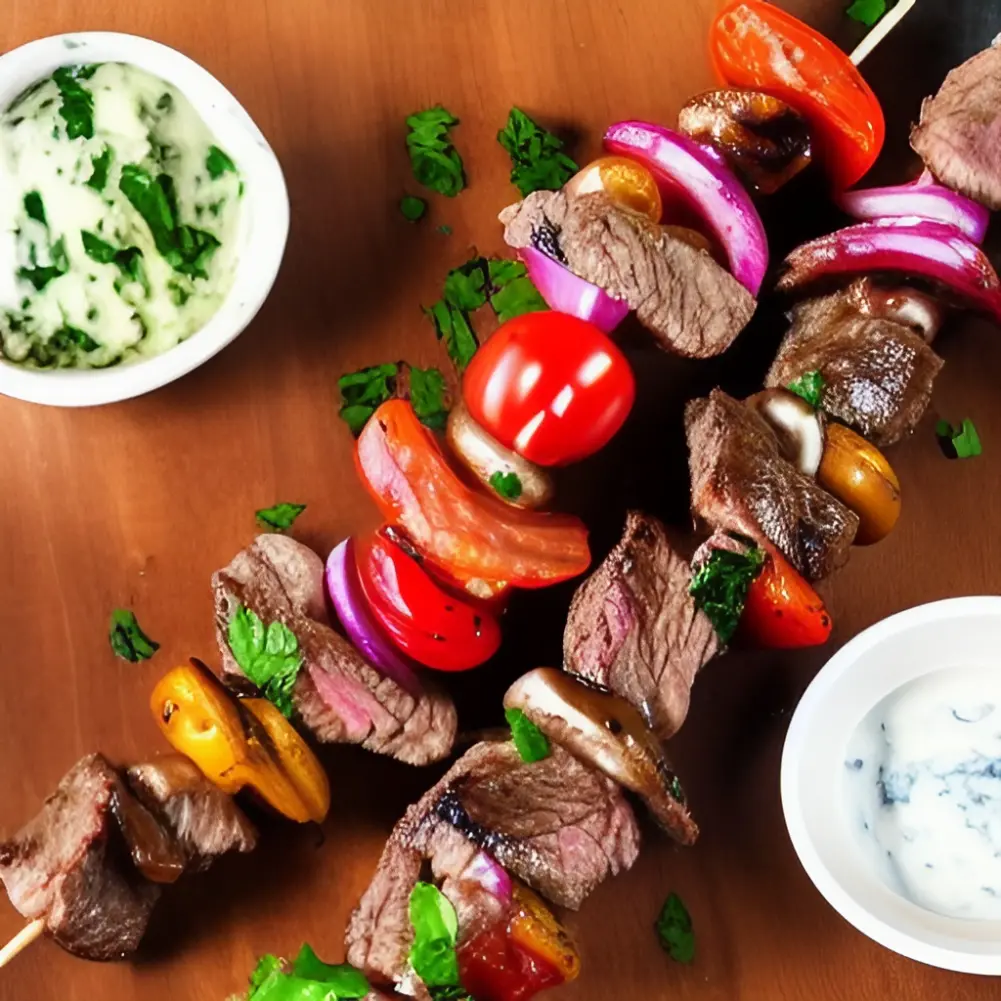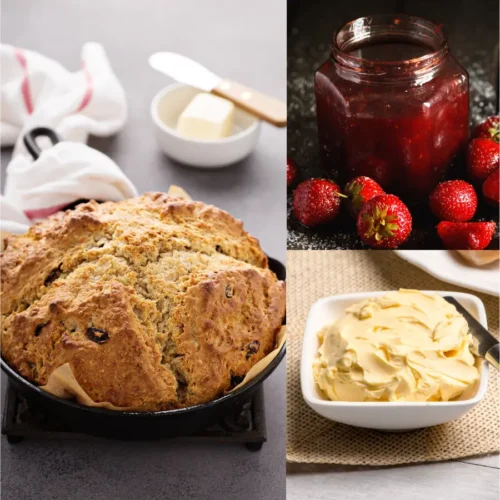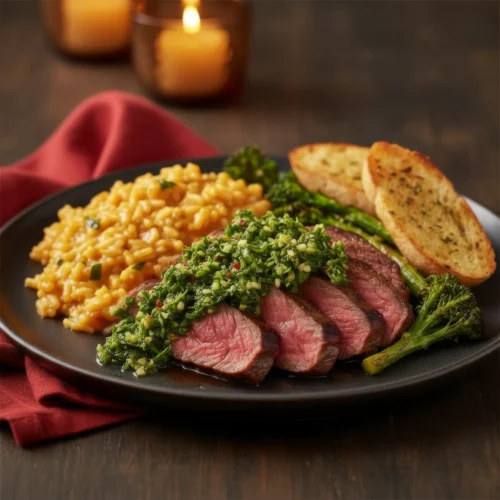Have you ever found yourself with a hankering for an authentic Italian meal, but feel daunted by the thought of complex recipes? Well, you’re in good company. We completely understand that yearning for simplicity when it comes to cooking at home, which is why we’ve immersed ourselves in the art of uncomplicated yet utterly delicious Italian cuisine.
Our step-by-step guide on whipping up Spaghetti Aglio e Olio will show you how to bring this time-honored pasta dish from Naples’ 19th-century roots right to your kitchen table using just a handful of ingredients.
Prepare to dazzle both your palate and dinner guests with this effortless culinary classic. Ready to roll up your sleeves and make some magic happen in the kitchen? Let’s get started!
Culinary Insights
- Boil pasta until al dente, then toss it with a fragrant sauce made from olive oil, minced garlic, and chili flakes for an easy yet flavorful Spaghetti Aglio e Olio experience.
- Use good – quality extra virgin olive oil to coat every strand of the pasta thoroughly and infuse it with garlicky goodness.
- Optional additions like fresh chopped parsley, grated Parmesan cheese or sautéed shrimp can enhance the flavors and customize your dish according to your preferences.
- With just a few key ingredients and simple steps, anyone can create this authentic Italian dish at home for a quick and delicious meal option.
Ingredients Needed for Spaghetti Aglio E Olio
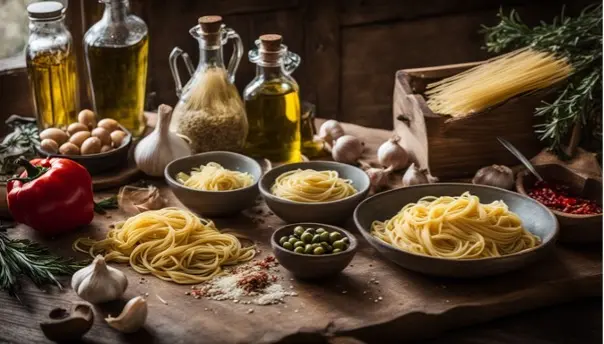
– For Spaghetti Aglio e Olio, you will need pasta, olive oil, garlic, and chili flakes.
Pasta: The Foundation of the Dish
The choice of pasta is crucial for Spaghetti Aglio e Olio. Traditional spaghetti works best due to its texture and ability to hold the sauce. When cooking the pasta, it is essential to cook it al dente, meaning it should have a slight firmness when bitten. This texture not only provides a pleasant chew but also ensures the pasta doesn’t become mushy when combined with the sauce.
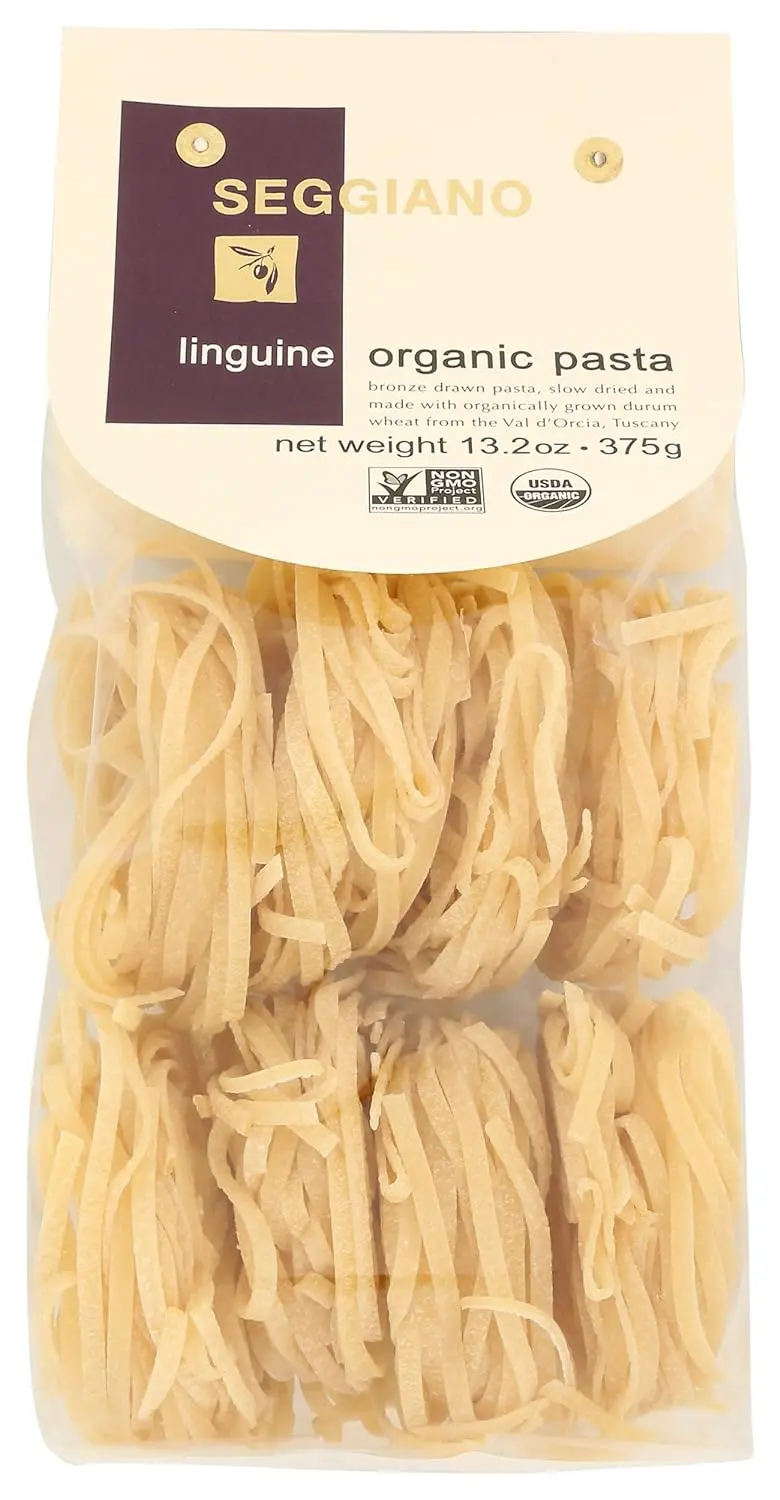
Fresh vs. Dry Pasta:
- Fresh Pasta: Made with eggs and flour, fresh pasta has a tender texture and a richer flavor. It cooks faster than dry pasta and has a delicate consistency. However, it may not hold up as well in this dish since it can become too soft.
- Dry Pasta: Made with durum wheat and water, dry pasta has a firmer texture and a slightly nutty taste. It is ideal for Aglio e Olio because it holds its shape and texture better when tossed with the sauce.
A pasta that we really enjoy and works well for this dish is SEGGIANO Organic Linguine Pasta. (Yes, we are breaking away from the traditional, but this works well and is one of our favorites!)
Importance of Pasta Water:
- Reserving pasta water is a crucial step. The starchy water helps emulsify the sauce, allowing the oil to cling to the pasta more effectively, creating a silky and cohesive dish. Adding a bit of pasta water to the skillet while tossing the pasta ensures the sauce coats each strand evenly, enhancing the overall texture and flavor.
Olive Oil: The Heart of the Sauce
Olive oil is the central ingredient in Spaghetti Aglio e Olio, providing a rich, fruity base that carries the flavors of garlic and red pepper flakes. Selecting a high-quality olive oil is essential for achieving the best results.
Types of Olive Oil:

- Extra-Virgin Olive Oil (EVOO): This is the highest quality olive oil, obtained from the first cold pressing of olives. It is unrefined, meaning it retains all its natural flavors and nutrients. EVOO has a rich, complex taste with fruity, peppery, and sometimes grassy notes. Its low acidity makes it ideal for this dish, where the oil’s flavor is prominent.
- Virgin Olive Oil: Also derived from the first pressing, virgin olive oil is slightly more acidic than extra-virgin and may have a less complex flavor profile. While it can still be used in cooking, it lacks the depth of flavor found in EVOO.
- Regular Olive Oil: This is a blend of refined olive oil and a small amount of virgin or extra-virgin olive oil. It has a more neutral flavor and higher smoke point, making it suitable for high-heat cooking but less desirable for dishes where the oil’s flavor is critical.
For Spaghetti Aglio e Olio, using extra-virgin olive oil is highly recommended. Its robust flavor complements the simplicity of the dish, enhancing the taste of the garlic and red pepper flakes without overpowering them. The quality of the oil can significantly impact the final outcome, making it worthwhile to invest in a good bottle.
Garlic
Moving on from the smooth taste of olive oil, let’s talk about garlic. This key ingredient adds a punch to our Spaghetti Aglio e Olio, making it burst with flavor. We crush or chop the fresh cloves so that they release their oils and aroma into the dish.
Garlic isn’t just tasty – it also fills up the kitchen with an amazing smell as it cooks in olive oil. Each piece turns golden and gives off a nutty scent that tells us it’s ready to join forces with pasta and chili flakes for an unforgettably simple yet delicious meal.
Chili flakes
Moving on from the flavor of garlic, another essential ingredient in Spaghetti Aglio e Olio is chili flakes. These tiny red pepper flakes add a subtle kick to the dish, balancing the richness of olive oil and the pungency of garlic.
When incorporating chili flakes into the aglio e olio sauce, start with a small amount and adjust according to your preference for spiciness. The heat level can vary, so it’s best to taste as you go along until you reach your desired level of spice.
For those who enjoy an extra bit of heat in their pasta, adding a pinch or two more of chili flakes can elevate the flavors without overwhelming them. Chili flakes also provide a pop of color to the dish, making it visually appealing as well as delicious.
Optional additions
To enhance the flavor of our Spaghetti Aglio e Olio, you can add a handful of fresh chopped parsley for a pop of color and herbaceous freshness. A sprinkle of grated Parmesan cheese will give the dish a delightful salty umami kick, adding depth to the flavors.
You may also consider adding some sautéed shrimp or grilled chicken on top for a protein boost and an extra layer of deliciousness.
Now that we have covered the optional additions, let’s move on to the conclusion where we bring it all together.
Spaghetti Aglio E Olio
4
servings5
minutes15
minutesEnjoy your Spaghetti Aglio e Olio with a glass of white wine and some crusty bread for a complete, satisfying meal. Buon appetito!
Ingredients
400 g (14 oz) spaghetti
6 cloves garlic, thinly sliced
1/2 cup High Quality extra-virgin olive oil
1/2 teaspoon red pepper flakes (adjust to taste)
Salt, to taste
Freshly ground black pepper, to taste
1/4 cup fresh parsley, finely chopped
1/2 cup grated Parmesan cheese (optional)
Lemon zest (optional)
Directions
- Prepare the Pasta:
- Fill a large pot with water and add a generous amount of salt. Bring the water to a rolling boil over high heat.
- Add the spaghetti to the boiling water and cook according to the package instructions until al dente. Reserve about 1 cup of pasta water, then drain the spaghetti and set aside.
- Sauté the Garlic:
- While the pasta is cooking, heat the olive oil in a large skillet over medium heat.
- Add the thinly sliced garlic to the skillet and sauté until it turns golden brown and fragrant, about 2-3 minutes. Be careful not to burn the garlic, as it can become bitter.
- Add Red Pepper Flakes:
- Once the garlic is golden, add the red pepper flakes to the skillet. Stir well to combine and let the flavors infuse for about 1 minute.
- Combine Pasta and Sauce:
- Add the cooked spaghetti to the skillet with the garlic and oil. Toss well to coat the pasta evenly with the sauce.
- Gradually add the reserved pasta water, a little at a time, to help the sauce adhere to the pasta and create a silky texture. Continue tossing until the spaghetti is well coated.
- Season and Garnish:
- Season with salt and freshly ground black pepper to taste.
- Remove the skillet from heat and stir in the chopped fresh parsley.
- If desired, sprinkle with grated Parmesan cheese and lemon zest for an added layer of flavor.

